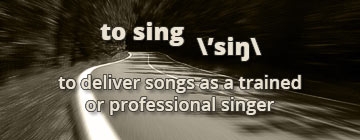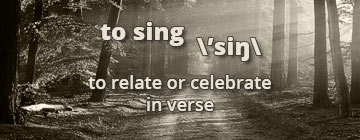Improve
Improve Your Song Choice
Choosing the right songs to sing is a skillset of its own, because the way of how you perceive your own performance and of how an audience does are usually two very different things. There are many factors that influence the decision to choose a song for ones repertoire, and then there are factors which are not that obvious and which we tend to overlook.
But placing a song into ones repertoire is not the only reason why a singer chooses to learn a song. You might choose a song for your development as an artist, per example because you want to learn a specific vocal ability, or you might choose a song to showcase your talent in an audition. Whatever reason you choose a song for, it is worth the effort to develop a kind of conscience towards song choice to avoid bad decisions.
Asking why we choose a specific song to sing gives us a perspective of the intent behind the choice. Depending on the situation there are a few considerations that can influence your choice in a supportive way.
In this article we have collected some advice for the following situations
- General advice
- Studying by learning a new song
- Visiting auditions
- Performing for an audience
- Adding a cover song to the repertoire
- Song Choice Checklist

Gramophone horn from the 1920s
^ General advice
It is a good practice to know the own voice and abilities when choosing a song to sing or perform. Know, what your voice physically can accomplish, and what stilistically fits to the tone of your voice. Choose the songs that you can accomplish easily over those that are too difficult to sing for your current ability as a vocalist. Avoid the songs that would reveal your weaknesses or that would let you struggle with its low or high notes.
If you can't hit the low or high notes you have the option to rescue your vocal delivery by changing the key of the song in a way that you can avoid singing the problematic pitches. It is also possible to only change the melody slightly by raising or dropping single notes within the scale. However, any changes to a song have to be carefully considered. Not everything works, and if it doesn't you should seek to choose another song.
While choosing the song, analyse its musical elements. Make sure the instrumentation of the musical background supports the lead vocalist, rather than to fight for the listeners attention. Are there different versions available, and which one suits you and your voice best?
Another point of attention is the melody of a song. This is important, because the flow of the melody transports emotions that can lift us to a supportive, intense and happy place, or drop us into a thoughtful, reflective and sometimes sad mood. Melodies should be strong throughout a song, and not become too monotonous in a specific part of the composition, unless it's an overall style. A melody which is easily understandable might be catchy and easy to sing along, factors which may even affect the popularity of a song. Constant change in melody might carry you as vocalist through your vocal range and produce drama and intensity, while monotonious melodies may present as flat and lifeless.
If you are unsure about your song choice, record your voice and listen back. Play the recording to friends, selected fans, and your vocal coach to get some feedback. Analysing the recording of your voice will allow you to understand issues quickly. You can transport this method into the studio environment, where you can avoid expensive studio time simply through taking the time to listen and analyzing your first recording.
^ Studying by learning a new song
If we take singing serious we naturally expect to improve our abilities as a singer. We might write our own songs, but a good way of learning is to sing cover songs, and even if it's just for our own ears pleasure. Choosing a song from a different artist means we choose a specific skill, vocal technique, timing ability, or other quality that song delivers, and ultimately we seek to become as good as its performer.
Yet, as a singer we go through many stages of development, meaning we have to look out for our abilities and compose a path of learning that suits us and our vocal health. Oftentimes we may simply expect too much from us, and to take an additional step during the learning process would do good, but how?
^ Improve on Vocal Range
Improving upon the vocal range takes time. You do not want to choose a song that is out of your range, meaning you feel unable to hit those notes. Forcing yourself to sing out of range and with improper technique even for single notes will hurt your health and may cause vocal injuries. Instead choose a song for which you are able to hit all the notes, even though some of them might not sound very well. The problematic notes might per example sound a little too thin, shaky, or rough. You can expect that you will be able to learn to control your voice through practice, improving on your tone and placement one practice session at a time.
^ Improve on Breathing
When you sing a new song you may notice that at some sections you may not be able to catch your breath at the right time, which results in an unwanted break of the flow of the melody. Don't choose the most difficult songs first, look at the tempo and rhythm of the vocal performance and the amount of lyrics to decide where you're at and choose songs that are only a bit beyond your abilities. Analyse when the performing artist is taking his breath, and do accompanying exercises that strengthen your core muscles for breathing which will enable you to get around with fewer breath. Also, look at different musical styles to experiment with different breathing techniques.
^ Improve on Diction
Improving on diction is important, because it will ensure that your audience will understand the lyrics better, and it will help you to stay on top of the musical background, especially in live environments. In regards to song choice you should choose songs that give you enough time to breathe properly and time to concentrate on the sound and vocal delivery of your performance. Make sure to choose songs that you already master well to avoid additional distractions. Another idea is to choose songs where the performer sings in a noticable dialect or (dare!) in a foreign language. Trying the perfect imitation could spark additional understanding towards diction and may help you to gain conscience.
^ Improve on Vocal Technique
From all the great singers out there, each one of them owns a unique or specific vocal style, sound and tone. To learn how these sounds and shapes are created can give you a deep insight into vocal technique and can be helpful to imitate these great singers. When you choose a song to improve on your vocal technique, make sure you listen to the expressed emotions and feelings of the singer. Can you relate to the lyrics? Is the song you're about to choose within your vocal abilities?
^ Visiting auditions
When you visit an audition your main task is to show off who you are as an artist, and that in the best possible light or better sound. Therefore when you choose a song for the audition make sure that the music and voice are tailored around you, that you are loving the song, and that the song fits your overall image. Know the strengths and weaknesses of your voice, and decide if you want to show off range or power. Also consider which area of your range sounds best. Keep in mind that the environment of the audition might have an effect of your delivery, and examine where this shows less.
Additionally there are a few more considerations for the audition environment:
^ Key
Choose a song that is written in the right key, fitting to the abilities of your voice. You may experiment to transpose the song a half step up or down to see if it makes a significant difference in comparison to the original.
^ Time Limitations
Keep in mind that sometimes the time of an audition may be limited, and that therefore it is necessary to shorten the song to the available time. Not all music delivers in the shortened version, so it's a good idea to consider this during song choice. In time-sensitive auditions you would rewrite the introduction of the song to a length not longer than 4 bars, or alternatively jump into your favourite part after a bell-tone, which is a single note played to give the starting pitch. For the ending it is often a good idea to make sure that your singing voice is incorporated as last sound of the audition, without compromising the harmonics of the accompaniment.
^ Accompaniment
It is a good idea to plan ahead for the specific audition situation. Therefore you want to know if you have any kind of accompaniment in form of a musical playback, a band, one or more musicians, or yourself. Take a look at the available instrumentation, and wheather you have access to backing vocals or not. If there's a chance, find out if the musicians are comfortable with your style of music. What would happen to your audition if your chosen song suffers from a bad arrangement?
^ A capella
When choosing a song for an a capella audition, it is advisable to pay attention to the melody line of the song. Choose one with a strong and prominent melody, and avoid complicated songs or those that come alive through their rhythm. Up-tempo songs also can be problematic for a capella situations.
^ Lyrics
Make sure you can relate to and feel the lyrics of the song you choose. Also ask yourself if the contents are appropriate to your own age, and are not offensive to the audience for which the winners of the audition might perform. If you sing a song that has been performed by the other gender examine if a simple change of the lyrics work and what happens to the meaning of the song.
^ Is there room for error?
When you choose a song for an audition, you may additionally want to examine what happens to your performance in the case that you wouldn't be able to hear yourself for a moment on stage, or what an otherwise bad accoustics or sound would do to the song.
^ Performing for an audience
When you perform to an audience, you want to present yourself and your vocal abilities in the best possible way. When you choose a song to include into your repertoire, you want to make sure that it is musically interesting, that it lies within your vocal abilities and range, and that you and your audience can connect on an emotional or intellectual level. Especially for the case that you still struggle with the vocal range and/or vocal technique of the chosen song you should estimate the amount of time it will take to improve on these things, and wheather there is enough time before the public performance.
Further it is a good idea to consider your audience, the venue and type of event, and the other performers at the event to determine if your choice of song is a good fit.
- Who will be listening to your performance?
- How old will the youngest and the oldest of your listeners be?
- Should you avoid problematic and/or offensive content?
- What are the demographics of the attending people?
- What is the purpose of the event?
Is it a fundraiser, family gathering, children's birthday, wedding…? - Where does the event take place?
- Who else will perform on the same event?
^ Adding a cover song to the repertoire
As a performer for original songs you might have thought of adding a cover song to your repertoire. While your original songs most likely are written to suit your voice and vocal abilities perfectly, any cover song you might choose was written for another artist. Keeping that in mind, you may ask yourself if your rendition of the song will sound interesting enough to stand out, or if you can exactly replicate the recorded version per example for a tribute.
You want to choose a song that is musically and emotionally strong and that does not fall flat in any part. Over all you very much want to transport your own personality, and you can support that by changing the arrangement or with extra care the melody of the cover song. As an aditional advice, try to avoid adding too many cover songs of the same artist, because an audience will tend to compare you to the original singer otherwise.
^ Song Choice Checklist
This checklist is intended to function as a quick general reference when choosing a song. Answer the questions to determine if your song choice is right.
- Why and for what purpose do you choose a song?
- Do you like the song?
- Does the song represent you as an artist and fit to your image?
- Does the song stilistically fit to the tone of your voice?
- Are there different versions of that song, and which one suits you best?
- Is it musically and emotionally a strong song, that does not fall flat in any part?
- Does the instrumentation of the musical backgound of the song support your vocals?
- Does the melody throughout the song bring your vocal range alive?
- Is the song within your vocal range/vocal abilities?
- What does a half step key change up or down do to your vocal delivery?
- Record your voice and listen back: Do you have any issues with the song?
- Is there enough time to work on any potential imperfections before a public performance?
- Does the song show off your strengths?
- Does the song stand strong under extreme or problematic situations?
- Can you emotionally connect with the lyrics?
- Is the content of the lyrics appropriate to your own age?
- Does the content of the song appeal to your audience?
- Where, to whom and with whom do you perform the song?














